|
|
Post by kenjifm on Nov 13, 2014 15:42:09 GMT 7
The two i know of which looks familiar are 1. Jason Holding 2. Silverlake Did you spot any which are similar? zuolun |
|
|
|
Post by zuolun on Nov 13, 2014 16:19:57 GMT 7
The two i know of which looks familiar are 1. Jason Holding 2. Silverlake Did you spot any which are similar? zuolunkenjifm, Most cheng kays in Singapore and Malaysia learned their stock-goreng skills from the same godfather in Bolehland. A typical potential BAL stock must meet 3 basic criteria in terms of chart pattern, price action and especially trading volume. Examples: 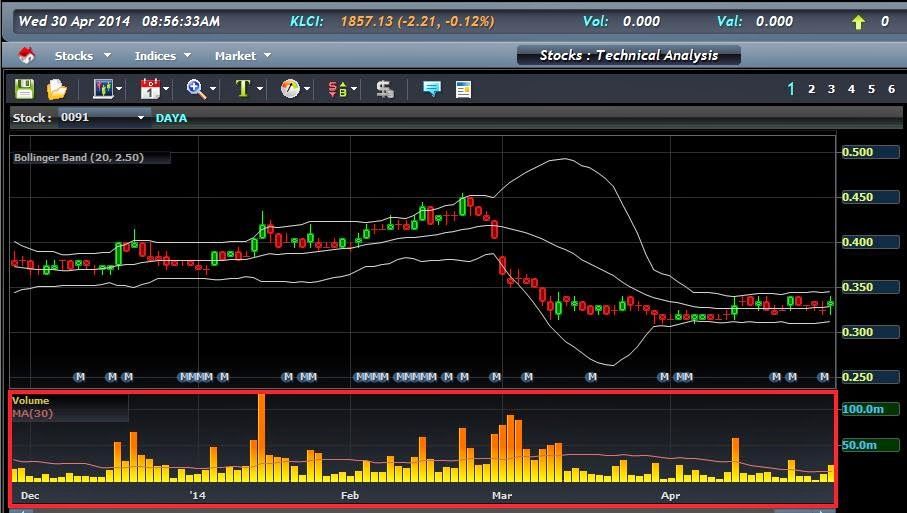 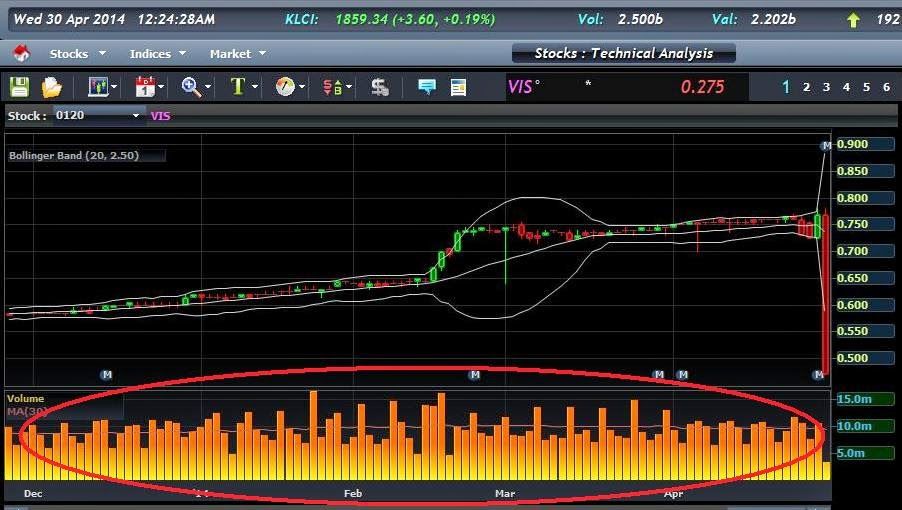 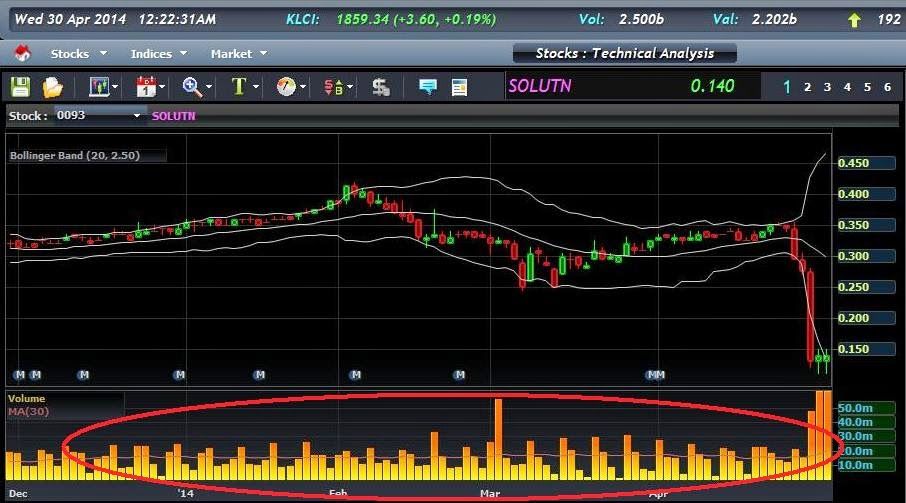 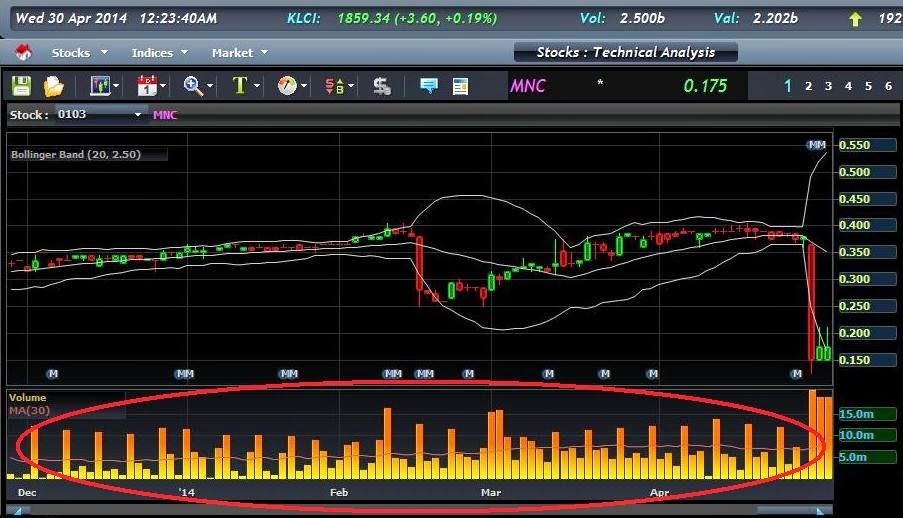 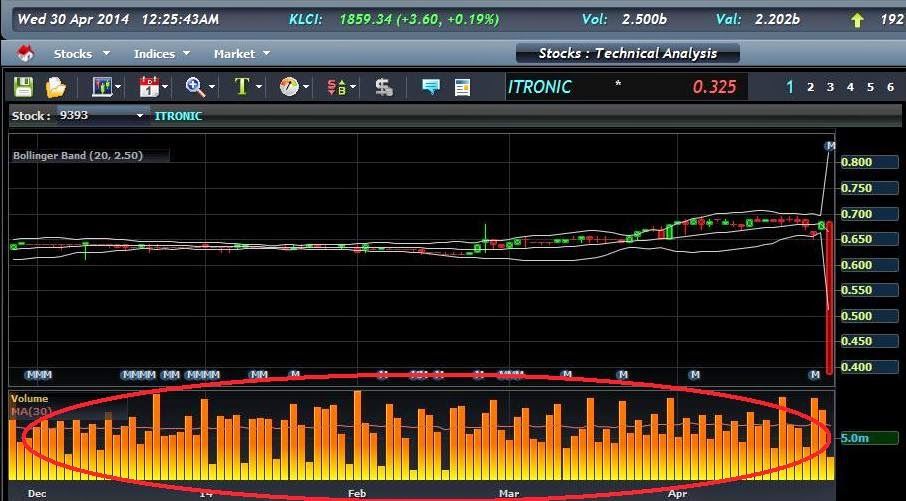 |
|
|
|
Post by zuolun on Jan 16, 2015 9:07:15 GMT 7
Based on chart pattern, price action and trading volume...The surviving cheng kays of the 3 infamous stocks; Asiasons, Blumont and LionGold had already moved on and re-started their businesses on one highly suspicious SGX-listed penny stock, which has exactly the same modus operandi as the 3 infamous stocks. 斩草不除根,春风吹又生。 If the roots are not removed during weeding, the weeds will grow again when the winds of Spring blows. UOBKH is always the 1st brokerage firm to issue trading curbs on the Singapore stock market. The latest updated list of restricted stocks is the best advice to identify which are the stocks to avoid. These stocks are being sieved thru thoroughly, updated and tagged as rotten/casino stocks for years. They won't disappear overnite but will become chameleons and change names frequently, fighting for survival. UOBKH Restricted Stocks – 14 Jan 2015 Is there a way to find out a fund/SSH's average price in a particular stock? Some may have been involved in a stock for more than 10 years, and to manually compute yourself using SGX announcements, one can only go back to 2010 (SGX's company disclosure page). The latest percentage of shares owned by any major longterm funds/SSHs (updated on the SGX's company disclosure page) is more important than the average purchase price bought over a long period of time (more than 10 years). One good example is SembCorp Marine. The stock has peaked @ S$5.03 and the longterm downtrend chart indicates that persistent strong selling pressure has been in place since 2011 till to-date and it's not done yet. SMM's strong selling pressure won't disappear overnite because when longterm funds buy; they'll buy, buy-on-dip and hold-long-long. However, when they sell; they'll sell and short-sell-long-long, thus the downtrend resumes after every dead cat bounce. Supply > Demand = Decrease in price. |
|
|
|
Post by zuolun on Mar 2, 2015 15:38:59 GMT 7
Stick to big-caps and mid-caps rotational play, especially the market mover stocks which are extremely protected = ring-fenced and/or have the BBs' strong support-buy when prices fell to attractive levels. Small-caps, penny and micro penny stocks are extremely speculative in nature (besides S-Chips, many kacang puteh SGX-listed companies remained listed on the SGX todate now become syndicate / casino stocks solely and strictly meant for gambling purposes only) so don't put too much money into them if you're not monitoring the share prices, intraday. ~ 28 Feb 2015 Sino Construction's share price collapsed and closed @ S$0.117 (-0.148, -55.8%) with 11.53m shares done on 2 Mar 2015.  |
|
|
|
Post by zuolun on Mar 3, 2015 8:58:04 GMT 7
Sino Construction's share price collapsed further to low of S$0.032 and traded @ S$0.068 (-0.048, -41.9%) with 20.05m shares done on 3 Mar 2015 at 9.55am. Stick to big-caps and mid-caps rotational play, especially the market mover stocks which are extremely protected = ring-fenced and/or have the BBs' strong support-buy when prices fell to attractive levels. Small-caps, penny and micro penny stocks are extremely speculative in nature (besides S-Chips, many kacang puteh SGX-listed companies remained listed on the SGX todate now become syndicate / casino stocks solely and strictly meant for gambling purposes only) so don't put too much money into them if you're not monitoring the share prices, intraday. ~ 28 Feb 2015 Sino Construction's share price collapsed and closed @ S$0.117 (-0.148, -55.8%) with 11.53m shares done on 2 Mar 2015.  |
|
|
|
Post by zuolun on Mar 11, 2015 15:21:59 GMT 7
Rubbish stocks : Learn this to avoid all the Crap!By MrWealthy4321 9 Mar 2015 Rubbish stocks are low quality stocks in the stock market. They are also called crappy stocks, inferior stocks and lousy stocks. Many people would think that people who invest in the stock market would stay as far away as possible from rubbish stocks but information from brokers show the opposite to be true – that many stock investors actually own a lot of rubbish stocks. I am sure you are wondering why on earth do people want to own rubbish socks? Don’t they know these rubbish stocks are high risk investments? Some really don’t but the majority of investors do know these stocks are high risk investments. Yet they will buy them because they are cheap and have the potential for extraordinary returns (if) they go up! 15 Characteristics of Rubbish Stocks1. Rubbish stocks are loss-making companies and mostly companies in a bad shape. 2. They are usually cheap penny stocks; stocks that trade below RM1.00 in the stock market. Initially, they could be trading higher than RM1.00, but because of the high losses they incurred in the business, many investors sold and the stock price dropped below RM1.00. 3. These stocks are companies having low NTA (Net Tangible Assets) per share. And the remaining assets they still own are usually poor quality assets that have little value and do not generate much income. 4. These stocks usually have high gearing and high debts. They are at high risk to close shop because of the high chance they could not service the mountain of debts they have piled up with the banks. 5. When the stock market goes up, rubbish stocks stay flat or goes down. Their price movements depends solely on the stock operators! 6. The management team of these stocks get rewarded with generous director fees, allowances and bonuses irrespective of the mounting losses of the company. 7. These stocks does not pay any dividends irrespective of profit/(loss) of the company. 8. Rubbish stocks are usually the target of stock market syndicates who love holding and playing these type of stocks. 9. Rubbish stocks are stocks with juicy stories and the focus of incredible stock market rumours. They are usually created by the stock syndicates to entice retail investors to purchase the stocks from them at a higher price later. 10. They are usually speculative stocks; they can go very high up within a short time frame. It is this factor which makes these stocks the darlings of retail investors wanting to get rich quick. Unfortunately, more people become poorer after dabbling in such stocks. 11. Rubbish stocks are usually the last stocks to move in a stock market rally. After the good stocks have moved and become expensive, stock operators will start moving their cash into these stocks for quick capital gains. 12. Rubbish stocks are stocks that are always asking investors for money. Every few years there is a rights issue or placing out shares (private placements) to new investors with no corresponding increasing in earnings. 13. Rubbish stocks are run by rubbish management. They prefer playing their company stocks for profit rather than running the company for a profit. They also engage in questionable tactics like selling their assets to the company at high valuations and approving stock options to themselves. 14. Rubbish stocks are stocks heavily promoted in stock market forums, stock market magazines, newspapers and even Facebook stock groups. Usually a sexy angle or a good story is attached to the stock to make it enticing enough to buy. 15. Rubbish stocks are stocks with poor earnings but trading at high valuations. A measure to gauge the stock price is to look at the PE (Price to Earnings) Ratio of the stock. Usually these stocks have high PE Ratio in excess of 50 or more. ConclusionSo now you know rubbish stocks. I could go on ...but just knowing these 15 characteristics of rubbish stocks should be enough for someone to avoid them. They are guaranteed to make you poorer in the long-term. Invest in fundamentally good stocks that can still be found in abundance in the stock market.
|
|
|
|
Post by web on Mar 11, 2015 17:51:58 GMT 7
Dear zuolun,
Thank you very much for your many posts. I have benefited a lot!
BTW, just curious, are you a full time trader?
|
|
|
|
Post by zuolun on Mar 12, 2015 8:03:42 GMT 7
I like this. "A lot of people get it wrong. When the bull market is here, they build debts. Bull market is the time to build cash. Because today’s market turns very quickly. When the market turns, you cannot sell, especially for the property market. You can only sell when things are going up." Dear zuolun, Thank you very much for your many posts. I have benefited a lot! BTW, just curious, are you a full time trader? , I'm a retiree and used to trade quite often in the past but I'm now 90% in cash.  Your question reminds me of Peter Lim: ‘Make sure you stay alive. The market won’t die, so there’s always a next time.’ |
|
|
|
Post by web on Mar 12, 2015 8:23:22 GMT 7
The quote was from Peter Lim, which I picked up in the article you posted in the Rowsley thread.
"A lot of people get it wrong. When the bull market is here, they build debts. Bull market is the time to build cash. Because today’s market turns very quickly. When the market turns, you cannot sell, especially for the property market. You can only sell when things are going up."
|
|
|
|
Post by web on Mar 12, 2015 8:32:10 GMT 7
I am about 85% in cash but I am still buying very selectively when there is a correction. The opportunity cost will be very high if the bull extends for another few years.
However, knowing myself, it is far easier for me to handle the emotion of not making big money than sitting on big paper loss or losing big money. Making or losing small money does not bother me.
|
|
|
|
Post by chlio on Mar 12, 2015 10:47:16 GMT 7
It is frustrating for me to have made the exit prematurely (on hindsight), and I am losing my patience for that collapse.  I am about 85% in cash but I am still buying very selectively when there is a correction. The opportunity cost will be very high if the bull extends for another few years. However, knowing myself, it is far easier for me to handle the emotion of not making big money than sitting on big paper loss or losing big money. Making or losing small money does not bother me. |
|
|
|
Post by chlio on Mar 12, 2015 10:54:33 GMT 7
When I first read oldman's book, the idea that caught my attention was that one is able to do this (stock market trading) until reaching an age mostly surpassing other professions. Hearing that you are retired and probably getting an income whilst having fun doing it makes me filled with envy.  I like this. "A lot of people get it wrong. When the bull market is here, they build debts. Bull market is the time to build cash. Because today’s market turns very quickly. When the market turns, you cannot sell, especially for the property market. You can only sell when things are going up." Dear zuolun, Thank you very much for your many posts. I have benefited a lot! BTW, just curious, are you a full time trader? , I'm a retiree and used to trade quite often in the past but I'm now 90% in cash.  Your question reminds me of Peter Lim: ‘Make sure you stay alive. The market won’t die, so there’s always a next time.’ |
|
|
|
Post by web on Mar 12, 2015 10:54:44 GMT 7
It is not easy to be out of the market completely and see the market keeps rising. Hence, I will still buy when I am offered a very, very good price. I also sell very, very slowly and do so when I am offered a very good price.
Alternatively, put your mind on something else. The crash will come eventually but I am not good enough to be able to foretell when it will come.
|
|
|
|
Post by chlio on Mar 12, 2015 10:58:40 GMT 7
Very true! There is a lot of wisdom in this forum from contributors and I hope to be able to learn and profit from it. I am grateful to all. Thanks thanks.  It is not easy to be out of the market completely and see the market keeps rising. Hence, I will still buy when I am offered a very, very good price. I also sell very, very slowly and do so when I am offered a very good price. Alternatively, put your mind on something else. The crash will come eventually but I am not good enough to be able to foretell when it will come. |
|
|
|
Post by web on Mar 12, 2015 13:09:37 GMT 7
Though I am senior in age, I am still a learner investor. When I made good money over the last few years, I almost thought that I was a grand master. Ha ha...
Mr. Market has humiliated me but kind enough to let me keep most of my gain. He looked straight into my eyes and said, "This is a bull market, any fool can make money!" Then, I realized.
When I opened my eyes, I saw so many great investors/traders around - in this forum and two other local forums which I visit regularly. They are all very smart but most importantly, they work hard, very disciplined and learn from their own mistakes and others' mistakes.
So, I tell myself, I need to have PHD to invest well! P: Patience; H: Hard Work; D: Discipline.
|
|